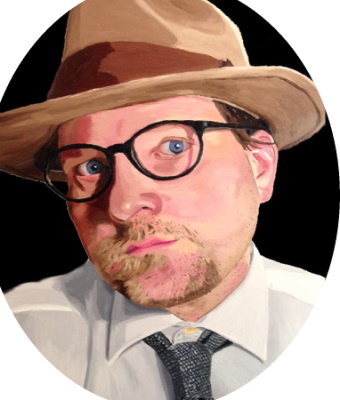Post by 1dave on Jun 27, 2022 18:10:58 GMT -5
www.benjamin-burger.org/ 
Benjamin Burger is THE Geology Professor at Utah State University’s Uintah Basin Campus located in Vernal Utah. His Youtube Channel features videos about geology and paleontology, including dinosaurs.
How Curiosity should Drive a Scientist
Geology, my own field of inquiry is like all great science, based on simple curiosity. A drive or interest in figuring something out and running through a series of tests and experiments that will yield an answer to your question. Good science is driven by this quest, a never-ending interest in finding out the mysteries that the world has to offer. Unfortunately, the gates into science has been closing on the free inquiry of knowledge, by a series of societal pressures to make scientists averse to making any mistakes— no matter how minor.
My students often struggle with the write up. Writing up the results of a study and publishing is like painting a bull’s eye on your shirt and standing in front of a series of the best skilled archers. If you come out alive then your manuscript has passed the peer-review process and can proceed to be published. Since these archers are so skilled, they cut an arrow straight for any weakness that the manuscript or study might have. A typo, misplaced decimal place, or miss-print can sink a six-month research project in an instant, often with a critical eye not on the conclusions of the paper, but on who and where the research was done, or even a personal dislike to the study.
When I was working in the oil fields, as a recent graduate, I would read about other scientists amazing fossil discoveries in journals I subscribed to and a depressing feeling would overcome over me, a simple feeling of jealousy. How come they found the cool fossil, and not I? Much of this I knew was my own insecurities, but it got so bad at times that I could not read about the amazing fossil discoveries that I had come to love as a student. I felt alienated from the field of science. This feeling is prevalent in most fields of science, that when a discovery is made and there is an unjustifiable harsh level of criticism, often because of this personal jealously.
The reason for this jealously, is that it is exceedingly difficult to find a job in science that allows you to carry out your own research, most research is tied to a particular project or funding set to look at some particular question, often not formulated by the scientist themselves, but by the government or company for which the scientist is held accountable for. This process is detrimental to the advancement of science, and I feel as a society keeps many people out of the STEM disciplines.
Imagine that an artist before they could show their work had to have each artwork reviewed by a panel of the six top artists of the county. Art itself would become less diverse, less daring, and less evocative in the process, and the art would no longer be produced for the public, but for a small minor of the best skilled artists. Hence the public would turn away from the unreadability of this work, as the art would be very formulaic and aimed toward a very narrow audience. It would be brilliant, but not very diverse. Reading scientific papers, you feel as if scientists have become a slave to dotting every i and cross every t. Students fall into the trap of referencing every possible study and producing the most detailed literature review possible in fear that one reviewer will reject their research because they forgot to cite some previous study.
I don’t have a solution to this problem, but I do offer a suggestion. If you find yourself reviewing a fellow scientists research, either as a submission to a journal or as a grant proposal, think about useful suggestions to improve the work, to make it better, rather than rejecting by its flaws. Offer comments you would like to receive if you were the author. Think of how much effort went into the study, and don’t stifle the research, but embrace it and encourage the researcher’s growth as they conduct their own quest. As a society, the future we are facing contains many problems and issues scientists can research and solve, so we all need as many future scientists as we can get.

Benjamin Burger is THE Geology Professor at Utah State University’s Uintah Basin Campus located in Vernal Utah. His Youtube Channel features videos about geology and paleontology, including dinosaurs.
How Curiosity should Drive a Scientist
Geology, my own field of inquiry is like all great science, based on simple curiosity. A drive or interest in figuring something out and running through a series of tests and experiments that will yield an answer to your question. Good science is driven by this quest, a never-ending interest in finding out the mysteries that the world has to offer. Unfortunately, the gates into science has been closing on the free inquiry of knowledge, by a series of societal pressures to make scientists averse to making any mistakes— no matter how minor.
My students often struggle with the write up. Writing up the results of a study and publishing is like painting a bull’s eye on your shirt and standing in front of a series of the best skilled archers. If you come out alive then your manuscript has passed the peer-review process and can proceed to be published. Since these archers are so skilled, they cut an arrow straight for any weakness that the manuscript or study might have. A typo, misplaced decimal place, or miss-print can sink a six-month research project in an instant, often with a critical eye not on the conclusions of the paper, but on who and where the research was done, or even a personal dislike to the study.
When I was working in the oil fields, as a recent graduate, I would read about other scientists amazing fossil discoveries in journals I subscribed to and a depressing feeling would overcome over me, a simple feeling of jealousy. How come they found the cool fossil, and not I? Much of this I knew was my own insecurities, but it got so bad at times that I could not read about the amazing fossil discoveries that I had come to love as a student. I felt alienated from the field of science. This feeling is prevalent in most fields of science, that when a discovery is made and there is an unjustifiable harsh level of criticism, often because of this personal jealously.
The reason for this jealously, is that it is exceedingly difficult to find a job in science that allows you to carry out your own research, most research is tied to a particular project or funding set to look at some particular question, often not formulated by the scientist themselves, but by the government or company for which the scientist is held accountable for. This process is detrimental to the advancement of science, and I feel as a society keeps many people out of the STEM disciplines.
Imagine that an artist before they could show their work had to have each artwork reviewed by a panel of the six top artists of the county. Art itself would become less diverse, less daring, and less evocative in the process, and the art would no longer be produced for the public, but for a small minor of the best skilled artists. Hence the public would turn away from the unreadability of this work, as the art would be very formulaic and aimed toward a very narrow audience. It would be brilliant, but not very diverse. Reading scientific papers, you feel as if scientists have become a slave to dotting every i and cross every t. Students fall into the trap of referencing every possible study and producing the most detailed literature review possible in fear that one reviewer will reject their research because they forgot to cite some previous study.
I don’t have a solution to this problem, but I do offer a suggestion. If you find yourself reviewing a fellow scientists research, either as a submission to a journal or as a grant proposal, think about useful suggestions to improve the work, to make it better, rather than rejecting by its flaws. Offer comments you would like to receive if you were the author. Think of how much effort went into the study, and don’t stifle the research, but embrace it and encourage the researcher’s growth as they conduct their own quest. As a society, the future we are facing contains many problems and issues scientists can research and solve, so we all need as many future scientists as we can get.










 ... to the New Guys from The ChatBox V.2 Crew
... to the New Guys from The ChatBox V.2 Crew